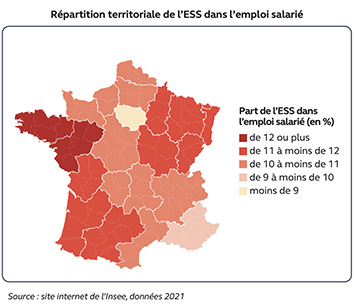The French Court of Auditors has published, for the first time, a report entirely devoted to the Social and Solidarity Economy (SSE), in response to a citizen request. The document marks a milestone for the sector and confirms both its weight in the French economy and the inadequacy of the public support it receives. It highlights the insufficiency of state support, which it considers lower than that granted to the conventional economy.
Recognized by the Law of 31 July 2014, the French SSE brings together more than 150,000 entities — cooperatives, mutual societies, associations, foundations, and social enterprises — that generate more than 2.6 million jobs, representing 13.7% of private employment in France.
According to data collected in the report, in 2024 the French government spent approximately €16 billion on the SSE, representing 3.61% of its net expenditure. This figure accounts for only 7% of total public aid to businesses, estimated at €211 billion, a percentage well below the 13.7% of private employment represented by the SSE in France.
The Court of Auditors thus dismantles the notion that the SSE is an overfunded economy. Moreover, only 4% of entities in the sector receive subsidies, most of which are directed towards ensuring social rights and local services, thereby complementing state action.
The report also criticizes the absence of a national strategic framework and therefore calls for the adoption of a national development strategy for the SSE. Among its main recommendations is the creation, by the National Institute of Statistics, of an “SSE satellite account” to measure more accurately the sector’s contributions and trends.
A shared diagnosis
ESS France, the representative body of the French social economy, which brings together organizations and regional chambers of the sector, shares the Court of Auditors’ assessment. It also underlines the lack of resources for support structures such as the Regional Chambers of the SSE (CRESS), which in 2024 received €20.1 million in state aid, later reduced due to budget freezes.
According to ESS France, this lack of resources prevents the CRESS from fully carrying out their missions to support the SSE, even though their role is comparable to that of the chambers of commerce, which support the for-profit economy and have much greater resources at their disposal
For ESS France, the publication of the Court of Auditors’ report constitutes a decisive step in understanding the sector. The organisation welcomes the fact that many of its long-standing demands have been taken up by the Court.
“This report marks a crucial stage in the recognition of the SSE,” stated Benoît Hamon, president of ESS France, adding: “SSE actors are determined to build on these recommendations to inform the forthcoming national development strategy and overcome the prejudices that still weigh on this sector.”







